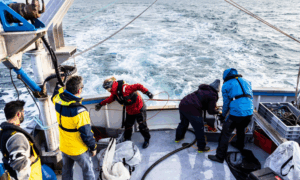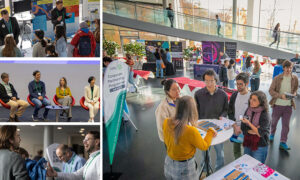
AI in Science Summit: Europe charts a new course for AI-powered discovery
EMBL joined European partners at AIS25 to explore how AI can advance life-science research and support Europe’s emerging strategy for AI in science
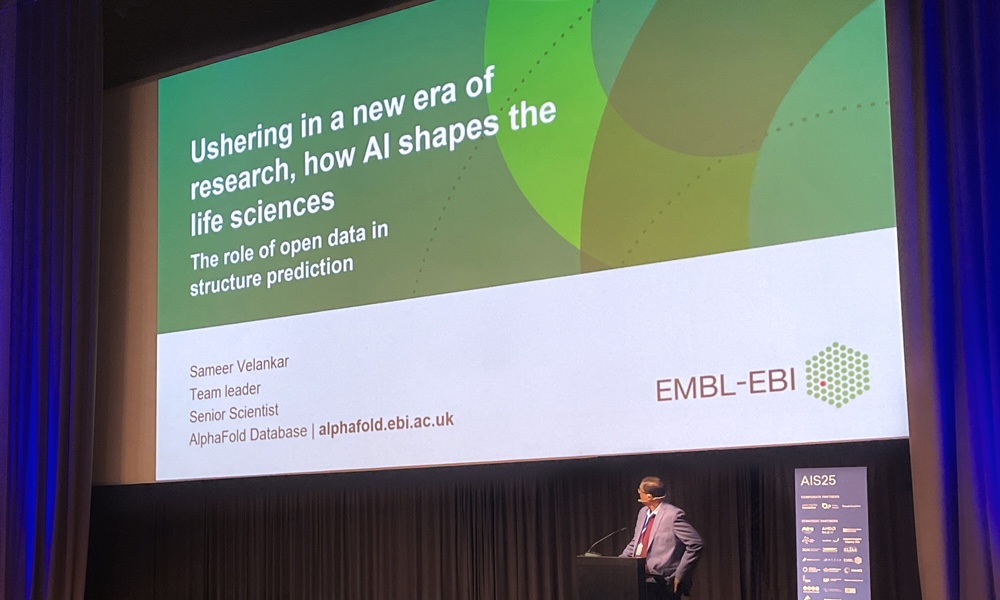
From 3–4 November 2025, Copenhagen played host to the AI in Science Summit 2025 (AIS25), a landmark gathering that brought together scientists, innovators, investors, and policymakers to chart the future of artificial intelligence in scientific discovery.
Co-hosted by the European Commission, the Danish Presidency of the Council of the EU, and the University of Copenhagen, the Summit came at a crucial time for European research, bringing focus and momentum to how AI can strengthen scientific discovery. It also marked the launch of the Resource for AI Science in Europe (RAISE) pilot, establishing the foundations of a coordinated, pan-European effort to support AI-powered science.
For EMBL, the Summit represented a moment of strategic importance. Throughout the event, EMBL was recognised as a model for excellence in AI-enabled life science research and infrastructure.
“We took inspiration from the collaboration between EMBL and Google DeepMind to understand how to make these kinds of public-private collaborations work. You need excellently curated data, an AI partner who understands science, and a dialogue between equals. That model is exactly what we’re aiming to emulate with the RAISE strategy.”
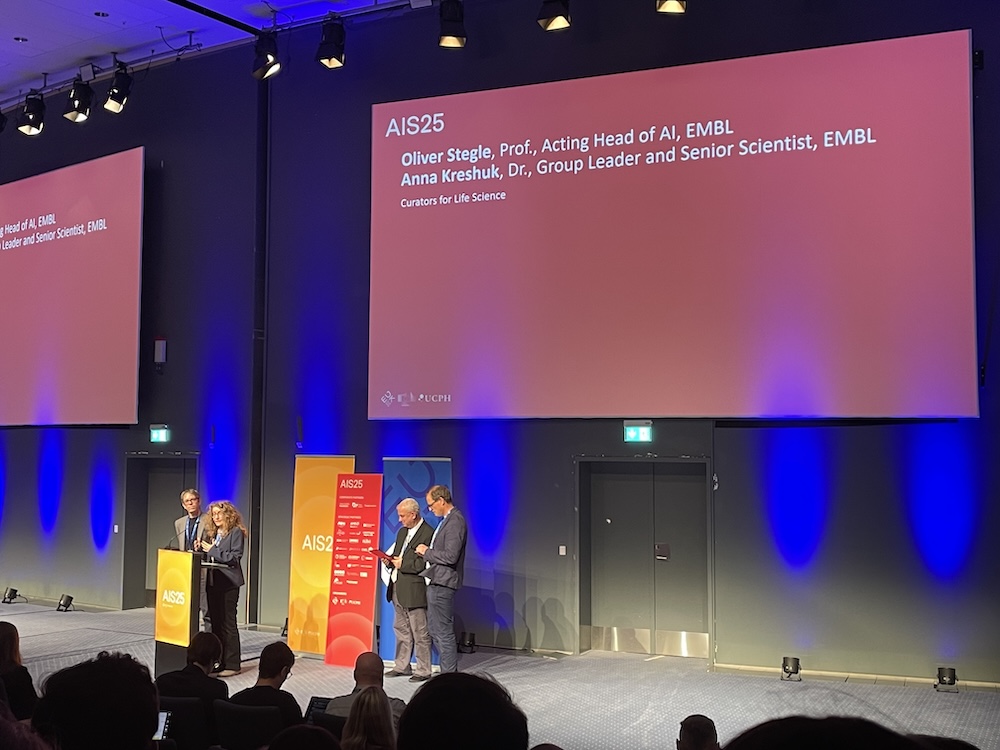
EMBL’s leadership in AI
EMBL participated in AIS25 not only as a scientific leader, but also as a policy voice in shaping Europe’s AI ambitions for science. Plamena Markova, Chief of International Relations at EMBL, represented the EIROforum – a grouping of Europe’s largest research infrastructures, including CERN and ESA, and currently chaired by EMBL – in a policy panel on the European AI in Science Strategy and the RAISE initiative, highlighting the importance of Europe’s world-class research infrastructures and scientific inclusiveness in the AI era.
 “Effective governance means scientific ownership, clear mandates, and sustainable foundations. With decades of experience managing large international organisations, EIROforum’s members know that stable leadership and predictable long-term investment are what turn ambitious visions into lasting success.”
“Effective governance means scientific ownership, clear mandates, and sustainable foundations. With decades of experience managing large international organisations, EIROforum’s members know that stable leadership and predictable long-term investment are what turn ambitious visions into lasting success.”
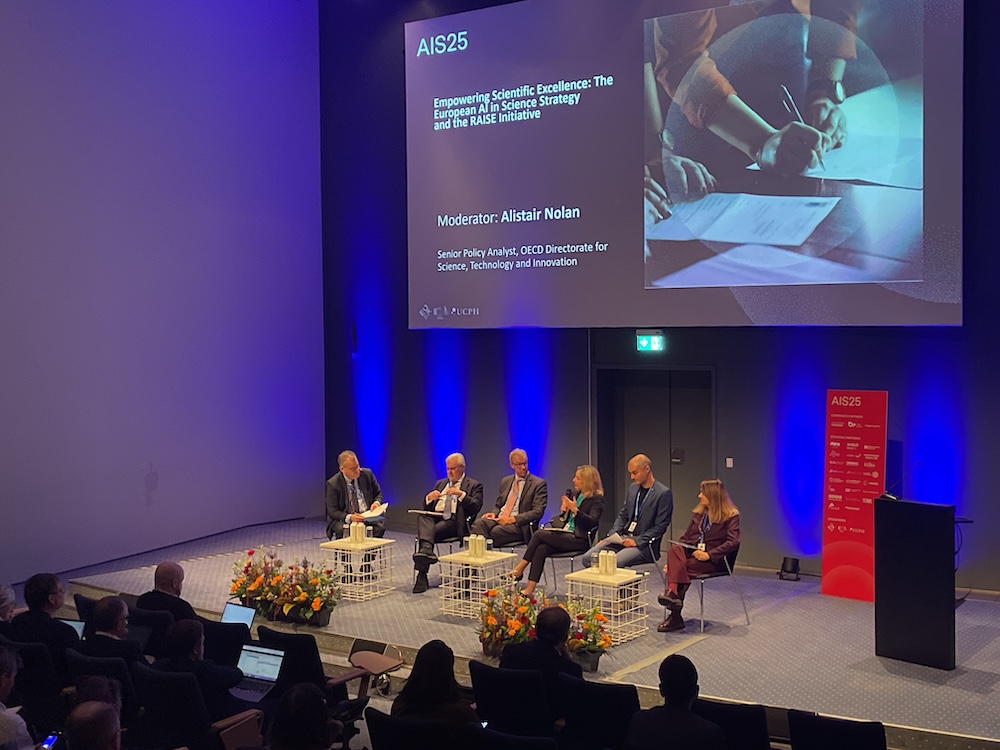
The Summit also provided valuable opportunities for personal interactions and in-depth discussions. Among the many exchanges with partners, collaborators, and decision makers, EMBL Group Leader and Senior Scientist Anna Kreshuk spoke to Commissioner Ekaterina Zaharieva about the importance of training, talent development, and the role of institutes like EMBL in supporting Europe’s future workforce in AI-powered life science.
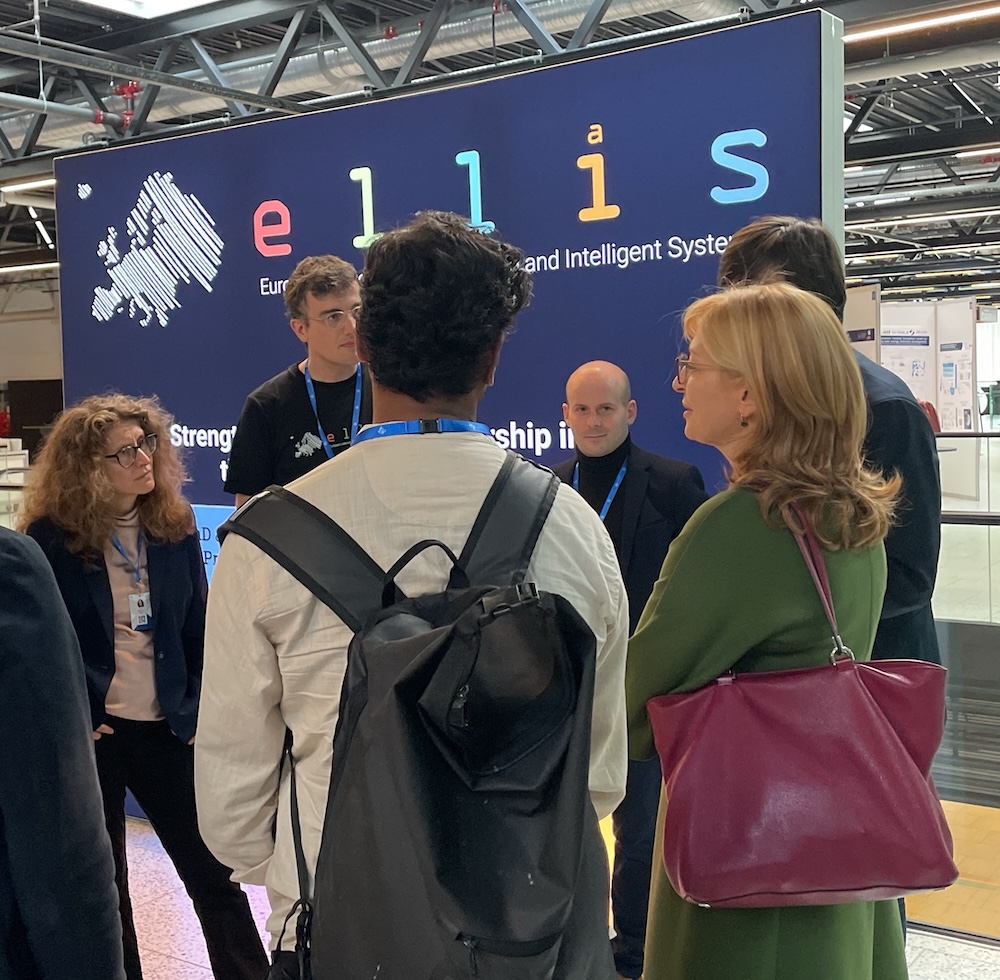
Life Science Thematic Workshop
Coordinated by Acting Head of AI at EMBL, Oliver Stegle, Anna Kreshuk, and EU Relations Lead Anne-Charlotte Fauvel, the Life Science Thematic Workshop brought together leading researchers, computational scientists, and innovators to explore how AI is reshaping the life sciences.
The programme focused on identifying the next wave of breakthroughs, from integrating molecular, cellular, and clinical data at scale to deploying trustworthy AI methods that accelerate scientific discovery. Speakers and audience also explored how the life sciences can continue to serve as a proving ground for cutting-edge AI and how Europe can ensure the talent, infrastructure, and policy foundations needed to support these advances.
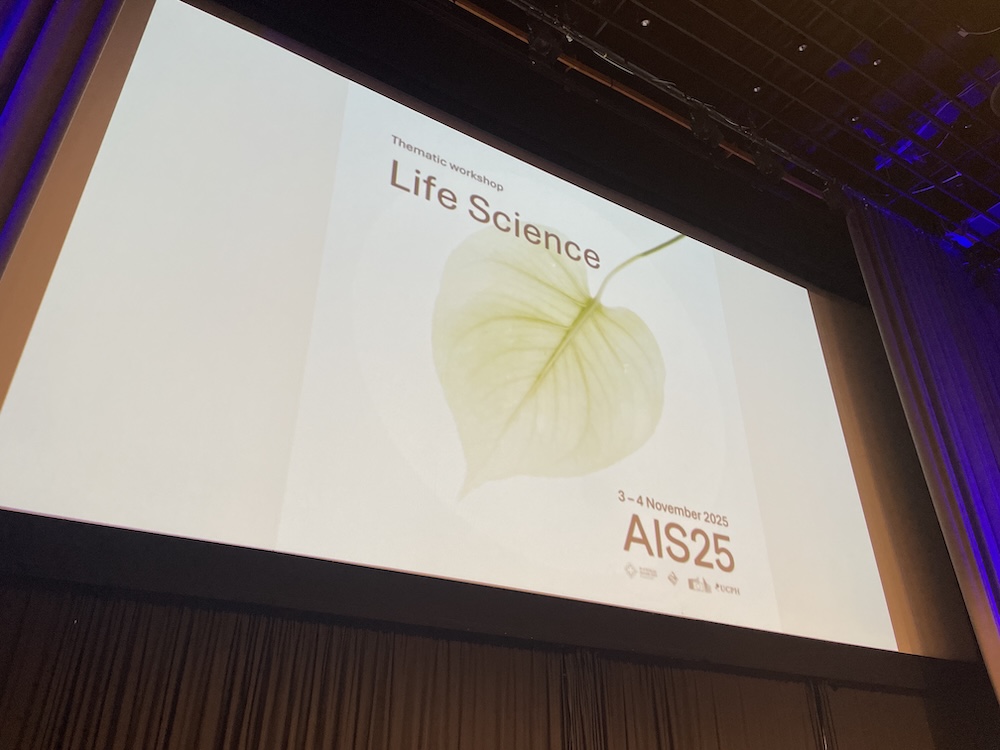
Setting the stage
Ewan Birney, Interim Executive Director of EMBL, highlighted the timeliness and momentum behind Europe’s AI-in-science agenda. He emphasised the powerful two-way exchange between AI and biology, where biological complexity both inspires new computational approaches and demands models capable of handling rich data. He also spoke on Europe’s strong foundations in research talent, computational infrastructure, and diverse biological datasets, pointing in particular to the long-standing role of EMBL-EBI in managing and sharing global biological data through its many open-access data resources.
The impact of AlphaFold
In a session titled ‘The Story of AlphaFold and Beyond: Unlocking the Next Frontier in Biology’, Agata Laydon, Science Pillar Lead for the Impact Accelerator at Google DeepMind, traced the journey of AlphaFold from a bold new idea to a game-changing scientific tool. Agata highlighted how AI is rapidly accelerating biological discovery from drug development and crop resilience to biodiversity and pollinator health. She talked about how AlphaFold is a foundational breakthrough that has opened new research avenues, empowering scientists worldwide by making protein structure predictions freely accessible.
“Using a tree of knowledge as a metaphor, AlphaFold was a root node problem. If you can solve a problem that is foundational, you don’t just add one discovery, or one leaf, to the tree. You add whole new branches of discovery that can grow.”
Sameer Velankar, Senior Scientist at EMBL-EBI, expanded on this from the infrastructure perspective, emphasising the critical role of European data stewardship and EMBL-EBI’s long-standing leadership in curating biological data resources, including hosting and serving the AlphaFold database to millions of users. Together, they reflected on the collaborative ecosystem that made AlphaFold possible, illustrating how deep partnerships between AI developers, data infrastructures, and the scientific community are essential to shaping the next wave of AI-enabled biology.
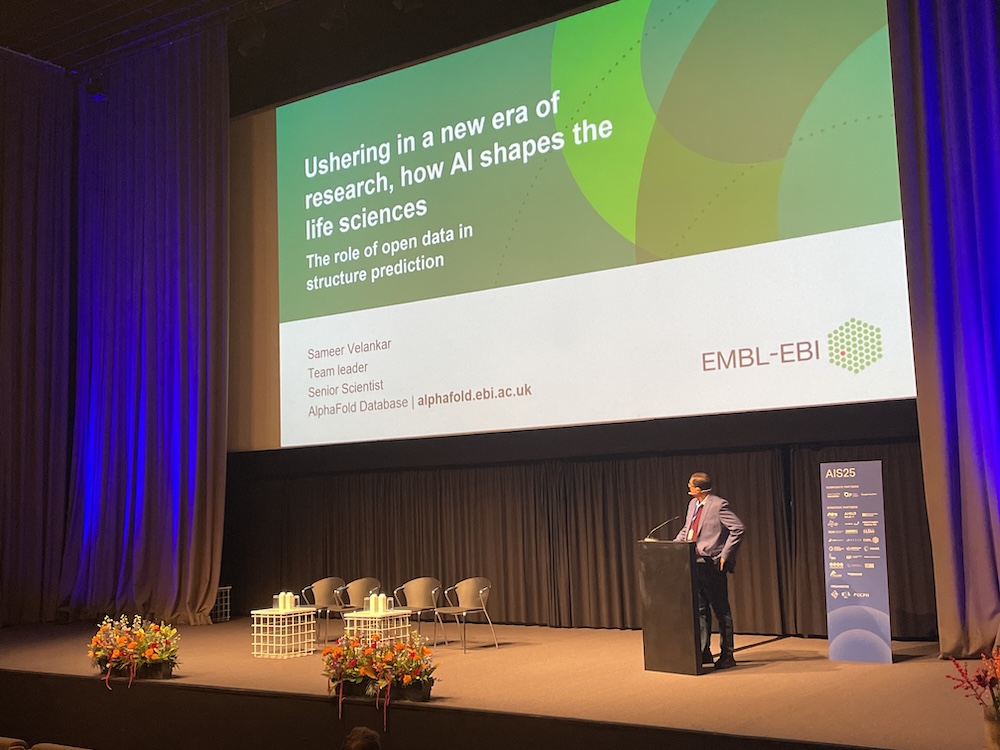
Securing the foundations
In the session ‘Securing the Foundations: Building the backbone for AI-powered life sciences in Europe’, the speakers highlighted the essential ingredients needed to enable AI at scale across European life sciences: from shared data resources to secure compute infrastructure for cross-border collaboration. A central theme was the need to pair cutting-edge models with robust, interoperable systems that allow researchers to train, test, and deploy AI tools responsibly and efficiently.
Together, the speakers pointed to a clear path forward: sustained investment in infrastructure, training and upskilling researchers, as well as sharing expertise across European institutions, will be critical to ensuring that Europe’s life-science community can use AI responsibly and competitively.
The future of AI in biology
In a forward-looking panel moderated by Jonathan Wareham, Professor of Information Systems at ESADE, speakers explored how AI is reshaping biological research and what Europe must prioritise to remain competitive. The panel included Oliver Stegle from EMBL, Michael Bronstein, Scientific Director at AYTHIRA, and Hugues Roest Crollius, Senior Research Director at CNRS.
The conversation touched on topics such as the opportunities in large-scale population and clinical data, the importance of ensuring that data and compute resources are accessible to researchers, and the need to rethink how scientific data are generated, shared, and used by both humans and AI models.
Foundation models for biology
In his keynote ‘Foundation Models for Biology’, Jean-Philippe Vert, CEO and Co-Founder of Bioptimus, outlined how large-scale biological foundation models could transform research and drug development. He described models trained directly on diverse biological data, from pathology images to multi-omics, that can improve tasks such as diagnosis and treatment prediction, even without labelled data.
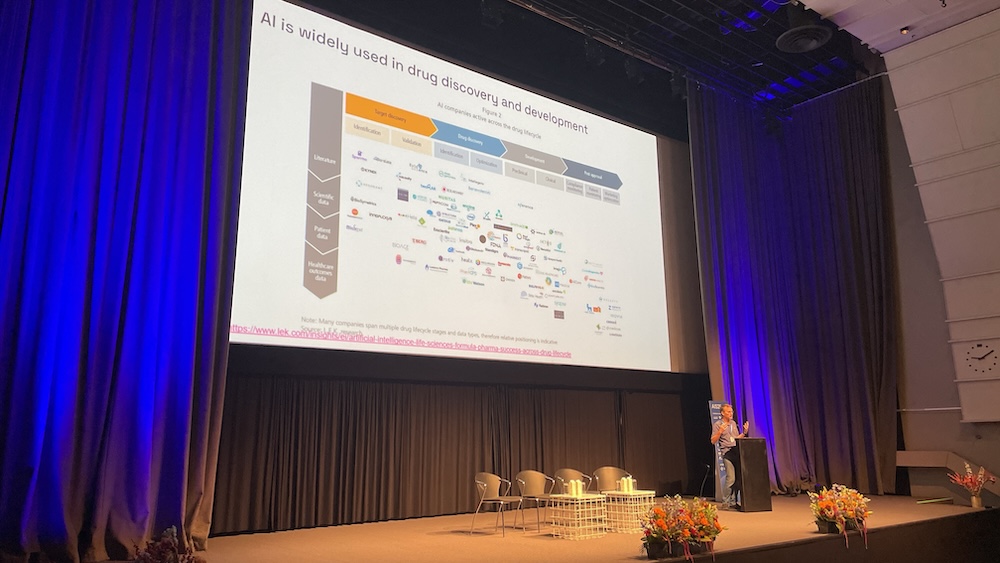
Vert emphasised that progress in this field will require open research, shared data, careful validation, and sustained investment to ensure AI-enabled insights translate meaningfully into real-world biological and clinical impact.
Looking ahead
For EMBL, the Summit was an important opportunity to interact with trusted partners, such as ELLIS, highlight the importance of open biological data and collaborative infrastructure, and contribute to policy discussions on how Europe can implement its AI-in-science ambitions responsibly and effectively.
What emerged during these two days in Copenhagen was the feeling that, with a shared commitment, Europe has the opportunity to make the most of applying AI to the understanding of life and advancing science for the benefit of society.
